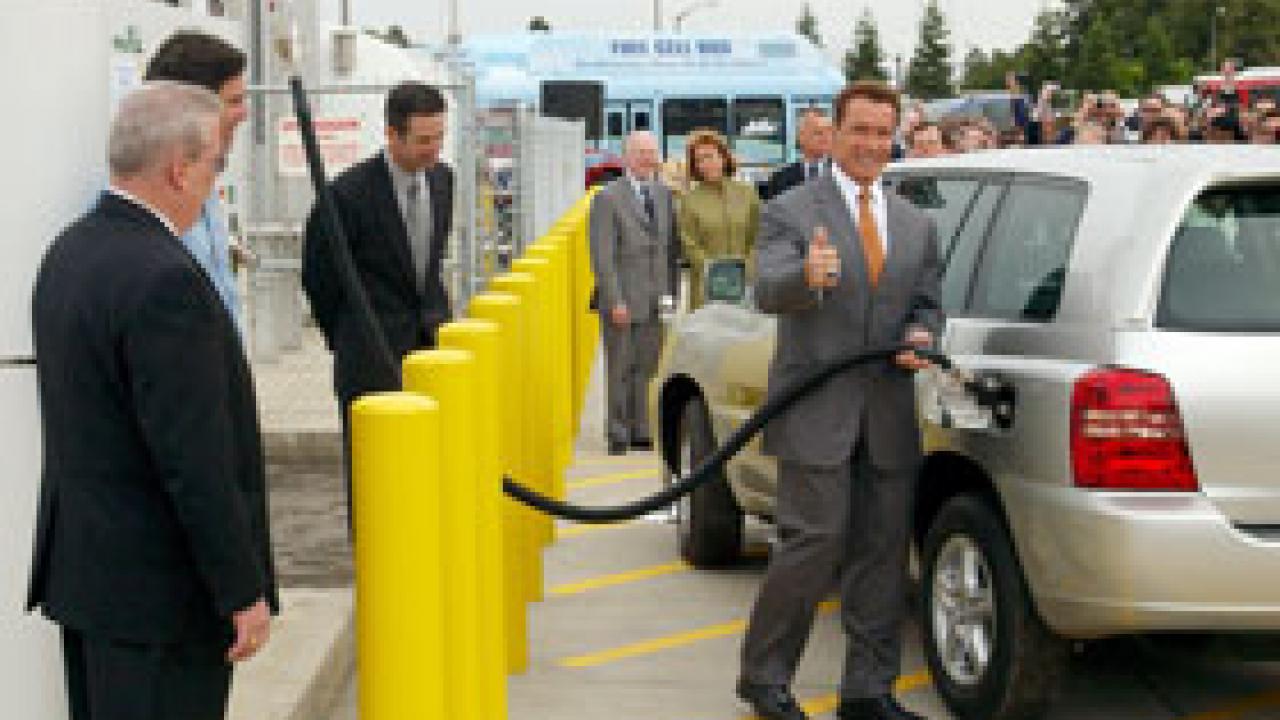With a cloudy sky above him, Gov. Arnold Schwarzenegger promoted hydrogen-powered vehicles as the future's bright transportation alternative during a visit to campus Tuesday.
"Let's create some action," said Schwarzenegger, signing an executive order to launch the nation's first Hydrogen Highway Network while a crowd of about 300 people looked on at the Unitrans Yard on Garrod Drive off of La Rue Road. "This starts a new era for clean California transportation," he said.
The event marked his first gubernatorial visit to a UC campus. Schwarzennegger drove a hydrogen-powered fuel cell vehicle to the media gathering and refueled it at UC Davis' new hydrogen fueling station.
The university's new hydrogen fueling station is the first publicly accessible station on California's Hydrogen Highway, and the governor was the first member of the public to use it.
"This is the future of California and the future of our environmental protection," he said.
The search for cheaper, cleaner fuels gave impetus to Schwarzenegger's Hydrogen Highways initiative. California's Hydrogen Highways involves the building of hundreds of hydrogen refueling stations across the state, creating an infrastructure for what some believe will be the fuel of the future.
Chancellor Larry Vanderhoef greeted Schwarzenegger, noting, "We see ourselves at the university as having a special responsibility to undertake objective research in the public's interest. Today's launching of the California Hydrogen Highway is an important step in the exploration of possibilities for the future."
The UC Davis Institute of Transportation Studies held the event in conjunction with the Governor's Office and the California Environmental Protection Agency.
The program consisted of a couple dozen hydrogen-powered vehicles on display with their manufacturers hosting exhibit booths. Dozens of media, local and national, were in attendance, cordoned off by moveable fences. A helicopter flew overhead toward the end of the governor's address.
"This is like a movie set, but it's better," said Schwarzenegger, adding that alternative fuels like hydrogen could help communities protect their environment and people from pollution. "Growth and protecting our natural beauty go hand in hand," he said.
The governor vowed that the state government would "lead by example" and build support for hydrogen fuel. He promised to seek federal funding for research and implementation efforts, and said businesses would look more favorably upon California when it offers alternative fuel choices in the future.
The Institute of Transportation Studies is a research unit on campus that receives funding from the government, private industry and foundations. Faculty and student researchers there have studied issues such as the adoption of new technologies by consumers and data analysis of emissions.
With more than 40 faculty members, 15 research staff and 80 graduate students involved, the ITS researchers are based primarily in the campus's College of Engineering and College of Agricultural and Environmental Sciences.
"None of us knows what the future of transportation will be. But we do know change is needed," said ITS-Davis director Daniel Sperling. "We should take wise first steps now to find the best path. Intelligent demonstrations, strong research and public education are imperative if California will continue to lead in efforts to clean our air and reduce greenhouse gases that are warming the planet."
To use the hydrogen fueling station, individuals and companies will have to sign an agreement with the university. The station offers pure hydrogen for refueling fuel-cell vehicles and hydrogen-enriched natural gas for refueling natural gas transit buses. It is capable of refueling up to eight light-duty hydrogen vehicles per day, and currently supports two Toyota hybrid vehicles and a Unitrans bus.
In its research fleet, UC Davis has two hydrogen-powered Toyota SUVs (the most at any university campus, a distinction shared with its sister campus UC Irvine) and a new transit bus, the first in the nation in everyday service to be powered by a blend of hydrogen and natural gas.
The campus Hydrogen Pathways research program is supported by 16 industry partners. Its station already is attracting non-university users. Two Honda fuel-cell cars participating in a demonstration project of the city and county of San Francisco drove to the governor's event today from San Francisco and refueled here for their return trip.
